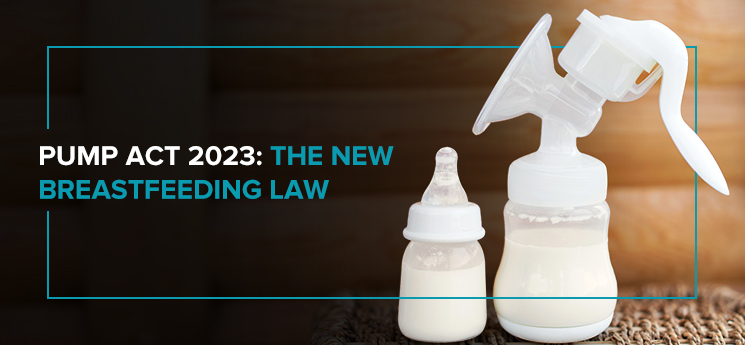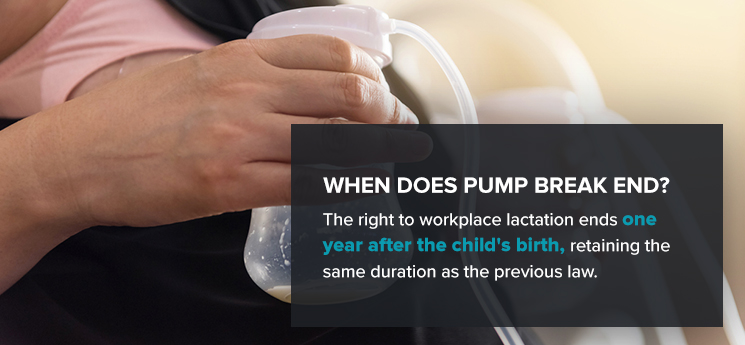By Weisberg Cummings, P.C. on July 17th, 2023
Despite the passage of a 2010 law allowing lactating mothers to pump breastmilk at workplaces, one in four women remained unprotected. Nine million workers, including registered nurses, teachers and farmworkers, had no right to express breastmilk in private. The newly passed PUMP Act seeks to bridge this gap by expanding the law’s scope and application, expanding the rights of breastfeeding mothers and their newborns.
What Is the PUMP Act?
In 2010, the Patient Protection and Affordable Care Act amended the Fair Labor Standards Act to require employers to provide nursing mothers sufficient time and a private, non-restroom place to express breast milk for up to a year after giving birth to a child. Unfortunately, this law had several loopholes.
The Providing Urgent Maternity Protection for Nursing Mothers Act is a federal legislation that extends workplace lactation protection and adds to the rights of breastfeeding employees in the United States.
Who Does the PUMP Act Cover?
The PUMP Act covers nursing mothers in workplaces, including seasonal, professional and agricultural employees. Special rules apply to specific employees — we’ll discuss that in detail later. However, it’s vital to note that this expanded law covers more people left out in the 2010 law.
How Long Are Pump Breaks?
Under the act, employees may use a reasonable break time to pump milk. The law does not specify a duration, allowing workers and employers to adopt an appropriate period on a case-by-case basis. Besides the duration, the frequency and timing must also be reasonable.
When Does Pump Break End?
The right to workplace lactation ends one year after the child’s birth, retaining the same duration as the previous law. Lactating mothers who wish to continue breastfeeding their babies after the one-year expiration may do so outside work hours. However, employers may allow employees to continue taking pump breaks as part of their workplace policy to support lactating mothers and their newborn children.
Are There Any Space Requirements?
Yes, the law mandates employers to provide private and suitable spaces for pumping and suggests using locks and signs while the place is in use. In summary, the area must:
- Be free from public and co-worker intrusion
- Be shielded from view
- Be available whenever the worker requires it
- Not be a bathroom
Employers can install privacy screens and create partitions to meet the legal requirements.
Must Employers Compensate Employees for Pumping Breaks?
While the PUMP Act doesn’t specifically require employers to compensate workers who take pump breaks, the FLSA mandates employers to compensate employees who do not get fully relieved from duty during the break. Short breaks count toward hours worked. An employer that provides paid break time for employees to pump must pay workers fairly.
Does the Law Apply to Certain Employees Differently?
Yes, the PUMP Act treats rail carriers and motorcoach service operators differently. First, the law does not go into effect for these employees until Dec. 29, 2025. Second, the law does not require employers in these industries to make accommodations requiring significant expense, such as increasing their crew membership, making unscheduled stops or removing seats. Employers do not have to take actions that would create unsafe conditions.
Are Any Businesses Exempt From the PUMP Act?
Small businesses with 50 or fewer employees may claim an exemption if adherence to the law imposes an undue hardship. Such employers must demonstrate that providing the required infrastructure would significantly impact their finances or cause challenges. Also, the PUMP Act does not protect airline crewmembers, specifically flight attendants and pilots.
Does the PUMP Act Apply to Remote Workers?
Yes, the PUMP Act applies to breastfeeding mothers who work remotely. Remote workers have the right to use private and shielded spaces in their homes or other workplaces without their employer’s observation. An employer who monitors an employee taking their pump breaks via laptop cameras, smart devices or security cameras breaches the law.
Can Uncovered Employees Seek Protection Under Another Law?
Uncovered employees may seek protection under other laws, including the Pregnant Workers Fairness Act, which took effect on June 27, 2023. The PWFA requires employers to make “reasonable accommodations” for conditions related to pregnancy and childbirth, including lactation.
What Should You Do When Your Employer Violates the Law?
If your employer fails to comply with the PUMP Act, you can take these steps.
1. File a Claim
You can file a claim with the Department of Labor’s Wage and Hour Division when your employer fails to comply with the PUMP Act or retaliates because you exercised your right to pump breastmilk at work. You may file the complaint online or by calling the agency. The DOL may request specific information, including your name, contact details, company name and location, the employer’s contact information, owner or manager’s name, type of work and how and when you get paid.
The DOL will typically ask a few questions and determine whether to investigate the situation. Investigators from the WHD may hold an initial conference with the employer or their representatives and tour the workplace. They may also interview some employees privately and review the employer’s records to assess their compliance with the law. Finally, the agency holds a final conference with the employer to discuss the outcome of the investigation and how to correct issues. The agency may order your company to pay you any back wages they owe.
Third parties may also file a complaint on someone else’s behalf. In that case, the WHD may require you to provide personal and employment information, details about your payroll and hours worked and employer information.
2. Sue Your Employer
The PUMP Act allows you to sue your employer for civil relief, including lost wages, punitive damages, emotional distress and attorney fees. You may initiate legal action if your employer:
- Violates the break time requirement
- Refuses to provide a private space for pumping
- Retaliates against you for taking a pump break
At least 10 days before commencing legal action, you must notify your employer of your plans to file a lawsuit.
Whether you are filing a claim with the WHD or instituting a legal action, it’s wise to partner with an employment attorney. Lawyers can help you gather all relevant information and present your case persuasively to yield a favorable outcome.
Contact Employment Attorneys in PA
The professionals at Weisberg Cummings have more than four decades of combined experience standing up for our clients’ rights in wide-ranging employment matters. We dedicate time and resources to provide individualized and efficient services and work closely with clients throughout the legal process. Contact us now if you have any questions about the PUMP Act.



